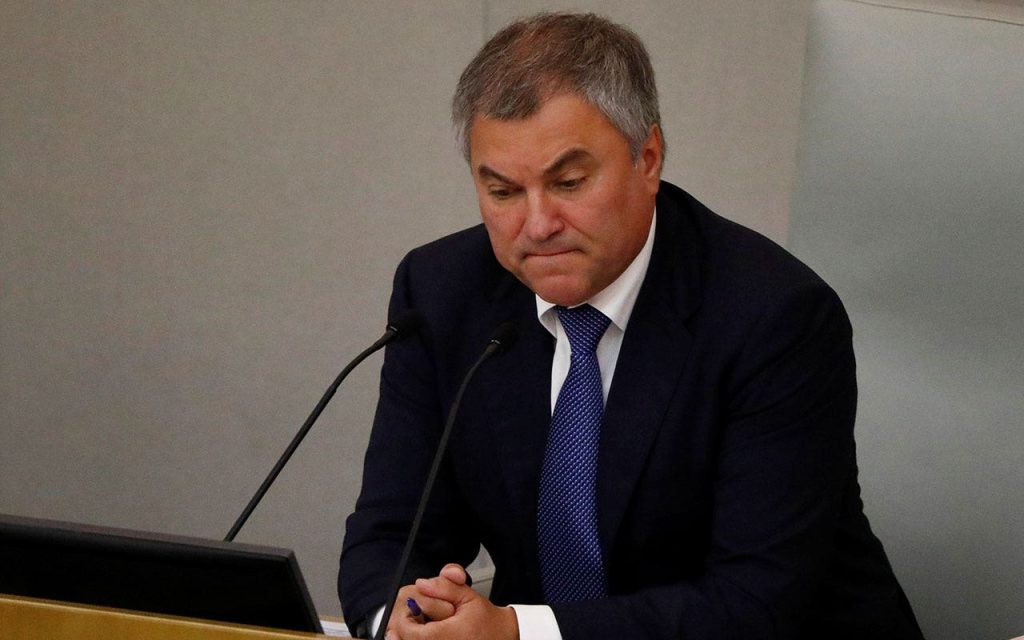The U.S. House of Representatives passed legislation allowing the transfer of seized Russian assets to Ukraine, causing Russia to consider confiscating Western assets in response. Russian lawmaker Vyacheslav Volodin warned that this move could provoke the EU to do the same, potentially damaging the European economy. Only a small portion of Russian assets, $5 to $6 billion, are in the U.S., while a much larger amount, about 210 billion euros, are in the European Union. Volodin stated that Russia now has grounds to confiscate Western assets, as they believe the U.S. is attempting to prompt the EU to take similar actions.
Volodin, a close ally of President Vladimir Putin, claimed that the U.S. passing a law on the confiscation of Russian assets was designed to provoke the EU to follow suit. This, he warned, could be harmful to the European economy. He stated that Russia has every reason to make symmetrical decisions in relation to foreign assets following this legislation passing in the U.S. Of the $280 billion of Russian assets frozen abroad, only a small fraction, $5 to $6 billion, are in the United States, with the majority, $224 billion, being in the European Union.
The House passed the “REPO Act,” which would allow the administration of U.S. President Joe Biden to confiscate billions of dollars’ worth of Russian assets held in U.S. banks and transfer them to Ukraine for reconstruction. This legislation has raised tensions between the U.S. and Russia, with implications potentially spreading to the European Union. The passing of this act has put Russia in a position where they feel justified in considering confiscating Western assets in retaliation. This move highlights the complex and tense relationship between Russia and Western nations, with actions and reactions taking place on a global scale.
The potential transfer of seized Russian assets to Ukraine has led to Russia considering confiscating Western assets, with implications for the European Union. Russian lawmaker Vyacheslav Volodin has warned that the U.S. House passing legislation on the confiscation of Russian assets may prompt the EU to take similar actions, which could have a detrimental impact on the European economy. As only a small portion of Russian assets are in the U.S., the majority of which are in the European Union, Russia believes they have grounds to take symmetrical actions in relation to foreign assets. The passing of the “REPO Act” in the U.S. has heightened tensions between the U.S. and Russia, potentially leading to further retaliatory measures.
Vyacheslav Volodin, a top Russian lawmaker and ally of President Vladimir Putin, has warned of possible repercussions following the passing of legislation in the U.S. allowing the transfer of seized Russian assets to Ukraine. Russia is considering taking drastic actions, including confiscating Western assets, in response to this move. With only a fraction of Russian assets frozen abroad located in the U.S., the majority being in the European Union, Russia believes it has justification for retaliatory measures. The passing of the “REPO Act” by the U.S. House, which would enable the transfer of billions of dollars’ worth of Russian assets to Ukraine for reconstruction, has significantly escalated tensions between the U.S., Russia, and potentially the European Union.
The passing of legislation in the U.S. allowing the potential transfer of seized Russian assets to Ukraine has set off a chain reaction, with Russia considering confiscating Western assets in response. Russian lawmaker Vyacheslav Volodin has warned that the EU may follow suit, which could have far-reaching consequences for the European economy. Russia, with the majority of its frozen assets abroad in the European Union, feels justified in taking symmetrical actions against foreign assets. The passage of the “REPO Act” in the U.S., which would enable the confiscation of Russian assets for transfer to Ukraine, has resulted in heightened tensions between the U.S. and Russia, with potential implications extending to the European Union. These actions reflect the complexities and challenges in international relations, particularly between Russia and Western nations.












